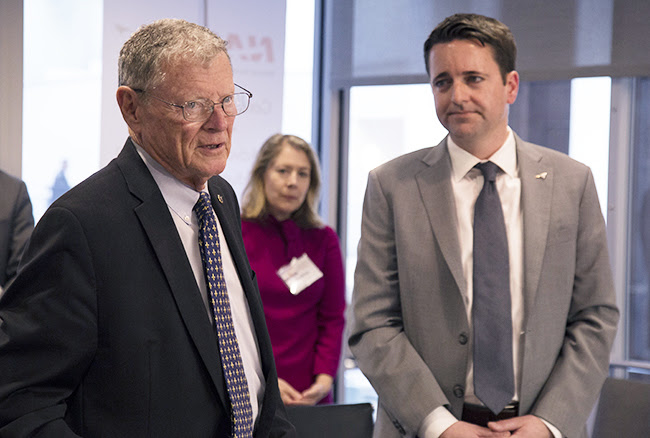
U.S. Sen. Jim Inhofe (R-Okla.), member of the U.S. Senate Committee on Commerce, Science, and Transportation; member of the Senate General Aviation Caucus; and certified flight instructor with more than 11,000 flight hours, today introduced S. 755, the Fairness for Pilots Act, which broadens protections for general aviation pilots provided by Inhofe’s Pilot’s Bill of Rights, which was signed into law in 2012.
“The Pilot’s Bill of Rights and the implementation of third class medical reform have been great victories for the general aviation community, addressing the concerns brought to my attention by pilots across the country,” Inhofe said. “There remains more work to be done. Building on my past efforts, the Fairness for Pilots Act increases due process protections for pilots, ensures greater transparency in dealing with FAA, and reduces the unnecessary bureaucratic barriers preventing pilots from flying. I look forward to working with my colleagues in the Senate and the general aviation community to get this bill through Congress and enacted into law.”
“AOPA supports the Fairness for Pilots Act and urges the Senate to approve this important legislation which will expand on Sen. Inhofe’s original Pilot’s Bill of Rights and provide additional protections so we can continue to enjoy the freedom to fly,” said Mark Baker, president of the Aircraft Owners and Pilots Association. “We appreciate Senator Inhofe’s continued work to ensure general aviation pilots are treated fairly.”
“We greatly appreciate Sen. Inhofe’s efforts on behalf of general aviation pilots with the introduction of the Fairness for Pilots Act,” said Jack J. Pelton, chairman and CEO of the Experimental Aircraft Association. “Today, more than ever, it’s essential to recognize and preserve the rights of individuals who seek to pursue the freedom of flight. This legislation is an excellent step in that direction”
“We commend Sen. Inhofe for advancing this important legislation,” said Ed Bolen, president and CEO of the National Business Aviation Association. “The reforms contained in the bill will promote fairness, while reducing costs and helping preserve and foster general aviation in America. The Senator has long been a true champion for the industry, and we applaud his continuing work to support its priorities.”
DETAILS ABOUT THE FAIRNESS FOR PILOTS ACT:
Enhances the due process rights established in the first Pilot’s Bill of Rights by ensuring airman have the right to appeal an FAA decision through a new, merit-based trial in Federal Court.
Increases transparency for airman subject to an investigation or enforcement action by requiring the FAA to articulate the specific activity under investigation to parties involved in the investigation and provide specific documentation relevant to its investigation.
Expedites updates to the Notice to Airmen (NOTAM) Improvement Program required in the first Pilot’s Bill of Rights and directs the FAA to include the effective duration of temporary flight restrictions in NOTAMs. This ensures the most relevant and important information reaches the pilot prior to a flight taking place. The legislation also mandates that the FAA certify the accuracy of posted NOTAMs.
Ensures the accessibility of flight data, such as air traffic communication tapes and radar information produced by contract towers, and flight service stations and controller training programs, which gives airmen the ability to use this information to defend themselves during an enforcement action proceeding.
BACKGROUND
On Jan. 10, the FAA announced the third class medical reform rule, as required by the FAA Extension, Safety, and Security Act of 2016. FAA set the implementation effective date for these reforms to be May 1, 2017.
On July 15, 2016, the FAA Extension, Safety, and Security Act of 2016 was signed into law and included provisions from Sen Inhofe’s Pilot’s Bill of Rights 2 reforming FAA’s third class medical certification process for general aviation pilots.
On June 14, 2016, the Senate passed the National Defense Authorization Act (NDAA) for fiscal year 2017 by a vote of 85-13, which included Pilot’s Bill of Rights 2. This was the third time the Senate passed Senator Inhofe’s legislation.
On April 19, 2016, the Pilot’s Bill of Rights 2 passed the Senate a second time, this time included in the FAA Reauthorization Act of 2016, which passed the Senate by a vote of 95 to 3.
On Dec. 15, 2015, the Pilot’s Bill of Rights 2 passed the Senate by unanimous consent.
On Feb. 26 2015, Inhofe introduced the Pilot’s Bill of Rights 2, legislation that would reform the third class medical certification for recreational pilots and broaden the protections provided in the original Pilot’s Bill of Rights authored by Inhofe and signed into law in 2012. The Senate Commerce Committee reported S. 571 as amended to the Senate by a voice vote on Dec. 9, 2015.
In June 2014, Inhofe released a draft of the Pilot’s Bill of Rights 2 legislation to the public and requested feedback from across the general aviation community. the EAA AirVenture Oshkosh fly-in convention that July, Inhofe also hosted a public forum to discuss and solicit input for the legislation. He received over 400 comments through his website from the general aviation community, which were read and considered in crafting the final Pilot’s Bill of Rights 2.Â
On Aug. 3, 2012, Inhofe’s Pilot’s Bill of Rights (S.1335) was signed into law, which made FAA enforcement proceedings and NTSB review fair for pilots; streamlined the NOTAM Improvement Program; and required a GAO review of the FAA’s medical certification process and forms in order to help bring clarity and reduce instances of misinterpretation with medical forms for pilots.



